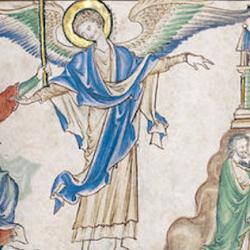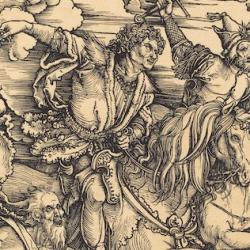There are a number of “seconds” in the book of Revelation. References to the “second death” surround the book (2:11; 20:6, 14; 21:8), and there is a second seal (6:3), a second woe (11:14), and several second angels (8:8; 14:8; 16:3).
The living creatures are enumerated, the lion first, the ox second, the man third, the eagle fourth. They speak in order as the seals are opened, enumerated as first, second, third, fourth. That might provide a clue to the praise of heaven in chapter 19. We know that the four living creatures are part of the choir (19:4), but they come third in the sequence. Before they speak, the human multitude speaks twice. We can link these with the first and second living creatures. The multitude first speaks with the loud voice of the lion, and then with the confirming voice of the ox.
If the order of chapter 4 holds, the living creatures and ancient ones would be voicing the praise of the man, but that does not fit here. Rather, we seem see here a revision of the order of the creatures, the third and fourth slots exchanging places. The living creatures and ancient ones voice the praise of the eagle. Only in response to the heavenly voice do we hear the final, mightiest voice, which is the voice of the human multitude, the voice of the man who celebrating the marriage of the Lamb to his woman. The order of praise is lion, ox, eagle, man.
That is a departure from what we have seen throughout the Apocalypse, where eagles take the climactic role (cf. 4:7; 6:7-8; 8:13). And that was a sign that the book is dealing with the events of the eagle covenant, the “new covenant” of the exile and restoration, symbolized by the eagle in flight. At the end of the book, we instead have human praise in the climactic fourth position. The man has taken the place of the eagle. On a small scale, we have a reflection of the broad theme of the book, the transfer from angelic to human rule of the cosmos. The living things and the ancient ones yield their places to the martyrs and saints and servants of God.










